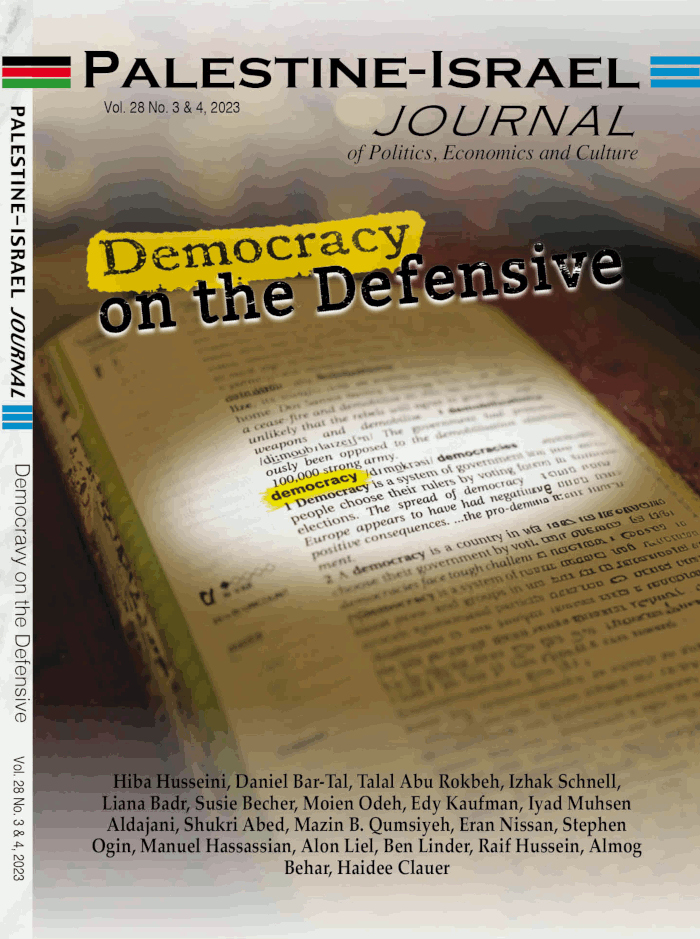.jpg)
The peace camp in Israel and Palestine recently lost a courageous veteran fighter who was always at the vanguard of the struggle for peace and justice for both his people, the Israelis, and the Palestinian people. He never hesitated to express his views and was one of the first Israelis to initiate contacts with the PLO and declare full support for the two-state solution. He believed that real, durable peace can be achieved only by recognizing the injustice done to the Palestinians and correcting that injustice through the realization of their right to self-determination in an independent, sovereign state of their own.
He was a genuine fighter for human rights and respect for human lives and had boundless energy which he used to initiate and take part in many projects aimed at securing peace between Israel and the Arab world, particularly the Palestinians.
Latif Dori was born in Iraq in 1934 and came to Israel in 1951 at the age of 17. He spoke Arabic fluently, and his command of the language alongside his commitment to human rights, justice, and peace gave him access to the hearts of Arab audiences in Israel, the occupied territories, and the Arab world.
In 1955, Latif became secretary of the Mapam (United Workers Party) Arab Department, working with Simcha Flapan, the founding editor of the Israeli peace monthly New Outlook. He later served as head of the city branch of the Younger Generation of Mapam.
In 1956, at the time of the Suez Canal war when Britain, France, and Israel attacked Egypt, all the Arab villages in Israel near the Jordaniancontrolled West Bank border were placed under curfew. Residents of the village of Kafr Qasim were unaware of the order and were late in returning home from the fields, and the Israeli forces opened fire on them, killing 49 men, women, and children. Despite the Israeli Government’s attempts to cover up the story, Latif got wind of it and snuck into the village to hear the accounts of the survivors. He followed up by going to the hospitals where some of the wounded had been taken and recorded their testimonies as well. He then went to Mapam co-leader Ya’acov Hazan to tell him the story, which was then published both in the party daily Al Hamishmar and in Uri Avnery’s Haolam Hazeh, breaking the silence around the event and leading to the trial of the perpetrators. In 1996, he was made an Honorary Citizen of Kafr Qasim in honor of his role in revealing the details of the massacre, and the municipality sent a special tribute to his funeral.
Following the 1967 war and until 1973, Latif served as secretary of the Movement for Peace and Security founded by Hebrew University Prof. Yehoshua Arieli and his colleagues. This was the first movement against the occupation. In 1984, he was among the founders of the Committee Against Racism and for Equal Rights of the Arab Citizens of Israel, which fought against Rabbi Meir Kahane and his racist Kach party, and was one of its leading activists. In 1986, he founded the Committee for Israeli-Palestinian Dialogue in which Mizrahi Jews were prominent and served as its secretary and coordinator. Latif organized conferences in which Mizrahi-Sephardi Israeli Jews met with Palestinians associated with the PLO.
In 1986, after a law was passed banning Israeli encounters with PLO members, Latif was the primary organizer of the first of two Israeli-PLO encounters that took place in Romania and Hungary. Upon their return from Romania, he and three other organizers were arrested and charged with violating the law. They never served any time in prison, but each paid a 5,000 shekel fine. In the 1990s, he served as the Meretz liaison with the Arab world, coordinating meetings with Palestinians and other Arab neighbors.
Between 1973 and 1993, when Abie Nathan’s pirate radio station “Voice of Peace” was broadcasting off the shores of Israel, Latif frequently broadcast programs in Arabic geared toward the Arab world.
In 2000, he was a personal guest of the King of Morocco, and in 2001 and 2003, he met with Fidel Castro as a representative of the Movement for Peace with Cuba.
A reflection of Latif’s ongoing concern for Palestinian rights was noted by Zehava Galon in her eulogy at the cemetery when she said that Palestinian President Mahmoud Abbas had asked her to tell Latif’s family and friends that he wanted to express his sincerest condolences and pain at the passing of “a dear personal and courageous friend.”
Latif was a longtime subscriber to and supporter of the Palestine- Israel Journal and at times a contributor as well. Furthermore, he was a partner in our struggle for peace and, above all, a friend whose presence will be sorely missed.
The PIJ Editors:
Hillel Schenker & Ziad AbuZayyad

